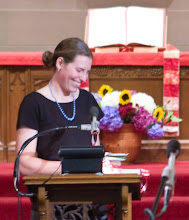What we see depends on where we stand.
One of my first and longest lasting lessons from Divinity School was on the importance of social location. I can't tell you how many assignments we began by naming who we are: I am white, female, lesbian. I am well-educated and middle class. I have upward mobility. And using language I never learned in Divinity School, I am Empire.
You could see it as simple identity politics: limited individual or group perspectives primarily about self-interest. OR, you could see it as recognizing agency, or lack thereof.
For instance, I have never once in my life thought to specially ask for a bag at the grocery store. If I only have one item, I might not even take the receipt. Then one day in a discussion group, one of my African American friends said it's a lesson she's had to teach her kids: always get a bag, always ask for a receipt. Otherwise you'll likely get stopped for shoplifting. I forgot about it, until one day in a West Nashville Walmart, it happened. Two black women, about my age were asked for their receipt by a checker next to the automatic sliding doors. When I reached for my receipt after them, the older white woman said, "Oh I don't need to see yours, but with some people you never know."
As a white, educated, middle class person in the United States of America, I have never known powerlessness. In fact, as a white, educated, middle class person I am the epitome of the United States of America, the most powerful nation in the world. I am this country that spends nearly as much on military power as every other country in the world combined. This country claims power over life and death over much of the world. It's not too radical to name our leadership in global oppression and violence: empire at its finest.
And so I've never known what it's like to not have power, until Good Friday.
I was kneeling, my red hands pressed against the cold pillars of the federal building when I heard a click to my left. My companion in risk and witness had been placed in handcuffs, and my own hands started shaking. The officer came to me next, taking first my left hand and then my right, behind my back. Click. Click. Stand up please. Come over here.
 A few tears rolled out then, and I realized for the first time in my life what it is like to have no agency, to be completely at the mercy of powers outside of oneself. I could no longer say, "Just kidding. I didn't mean it." I could not walk away. I could not wipe my own tears or brush my windblown hair away from my face. We were led up to a hallway on the fifth floor, and then one by one we were searched. "Do you have any weapons or anything sharp in your pockets?" No. The female officer put on gloves before she touched me. Then she unzipped my jacket and ran her hands up and down my legs and inside my shoes. She reached into my jeans pocket and took my cell phone, keys, and wallet, tossing it all into a plastic bag.
A few tears rolled out then, and I realized for the first time in my life what it is like to have no agency, to be completely at the mercy of powers outside of oneself. I could no longer say, "Just kidding. I didn't mean it." I could not walk away. I could not wipe my own tears or brush my windblown hair away from my face. We were led up to a hallway on the fifth floor, and then one by one we were searched. "Do you have any weapons or anything sharp in your pockets?" No. The female officer put on gloves before she touched me. Then she unzipped my jacket and ran her hands up and down my legs and inside my shoes. She reached into my jeans pocket and took my cell phone, keys, and wallet, tossing it all into a plastic bag. This is what it feels like to oppose a system: swallowed into something that makes you invisible.
Within two hours I had it all back: plastic bag full of my personal items, wrists and hands only slightly worse for the wear. Within a day my shoulders were no longer sore from the way my arms rested pulled back in handcuffs. Within the month I'll likely have paid my fine to the federal government and be restored in all my glory as a white, middle class, educated American citizen.
I want to say I was bearing witness to an alternative that doesn't succumb to those platitudes we tell ourselves because of our agency:
Ultimately I wonder how I might be changed. Certainly somehow, for because of those three hours on Good Friday, I'm not standing in the same place anymore.
- The federal government does good things too, funding social services and providing for the public good.
- We can't do anything to change the system, so might as well not try.
- Life is short. Why make it harder than it already is?
Ultimately I wonder how I might be changed. Certainly somehow, for because of those three hours on Good Friday, I'm not standing in the same place anymore.





